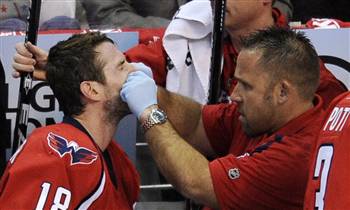 You’ve all heard the expression “take one for the team”. I believe in that and think it’s important to be willing to stand up and do something for the benefit of your team or your employer. But, can it be taken too far?
You’ve all heard the expression “take one for the team”. I believe in that and think it’s important to be willing to stand up and do something for the benefit of your team or your employer. But, can it be taken too far?
Friday night during the Captials vs. Canadiens game, Eric Belanger, center for the Capitals lost numerous teeth when he was hit in the mouth with a stick. A Canadiens player, Marc-Andre Bergeron, hit him during the first period of playoff game #5. Belanger took some time off the ice to have some emergency dental work done on the sidelines, then made it back in the game by the third period.
I don’t know if he should be applauded for putting his own pain aside in order to come back to help his team. Or, if he is just plain stupid to risk his health like that.
What do you think? Does he have employer and team loyalty? Is his choice something that should be applauded? Should his employer (via the coach) have pulled him from the game once he was injured?



8 Comments
Hi Trish,
Eric’s a contract employee who makes millions of dollar. I’m also sure the NHL has a great dental plan. Barring a deeper medical issue, such as a concussion, I think he made a reasonable decision.
Professional sports is not the same as the average workplace though, so I wouldn’t ask or expect a colleague to make that same choice.
@Victorio- I agree with you. Let me ask you this, if it were a CEO that makes millions of dollars who fell down the stairs right before a big global meeting and busted out 8 teeth, would you expect him to shake it off and head into the meeting? Is that really different if we’re bringing it back to the money? What if he was headed into a meeting with global leaders from a company he was about to purchase and this is the ONLY time he can ever have with them?
This might sound ignorant, but it’s hockey. People play through broken bones and torn ACLs and still play (even shake hands after the game). Losing teeth is like a boo-boo in hockey. Besides, if he left the game, Dan Carcillo (http://media.nj.com/devils_main/photo/bennett-carcillojpg-35a71244649639a6_large.jpg) will be laughing at him.
By the way, if there was a deadline, the Caps would fail since they’re suppose to win the series in 5.
@Tracy- You know, I’m totally with you on that. My family laughs when I get all worked up about pro athletes who “get hurt” and won’t play. My only question on this, I guess, is what is the limit? In football for example, if you’ve got a broken bone in a cast, you can play. However, if you snap your leg or arm in half during the game, you’re out. In hockey, if you lose a tooth it isn’t a big deal. What got me in this case is that he lost 7 or 8 teeth and the roots were exposed, so they trimmed them right on the spot. ICK! That seems like a little too much for me, but I get it. It’s hockey. 🙂
Trish,
There’s definitely a limit. This is why I love hockey because they battle every second. The only limitation hockey players are head injuries and if anything is less than 100%. If I have a speedy guy and can’t skate at full speed, I won’t play him since he could be a liability or someone who has a wrist injury and can’t shoot.
You have to look at each injury if its affecting them. Teeth are the least of their concerns (except Crosby).
Its not just hockey, its sports in general. Its the mentality that to make it at that level and stay at that level, you cannot quit, no matter what. They’ll take cortazone shots and continue, even on torn ligaments or they’ll have dental surgery on the bench and then play 20 minutes later! Translate that into the corporate world and it’s a reason to request FMLA.
A second chance for employee loyalty in the 21st Century reality. Business and the public sector are into a phase of creative disassembly where reinvention and adjustments are constant. Hundreds of thousands of jobs are being shed by United Technologies, GE, Chevron, Sam’s Club, Wells Fargo Bank, HP, Starbucks etc. and the state, counties and cities. Even solid world class institutions like the University of California Berkeley under the leadership of Chancellor Birgeneau & Provost Breslauer are firing staff, faculty and part-time lecturers through “Operational Excellence”. Yet many employees, professionals and faculty cling to old assumptions about one of the most critical relationship of all: the implied, unwritten contract between employer and employee.
Until recently, loyalty was the cornerstone of that relationship. Employers promised job security and a steady progress up the hierarchy in return for employees fitting in, performing in prescribed ways and sticking around. Longevity was a sign of employer-employee relations; turnover was a sign of dysfunction. None of these assumptions apply today. Organizations can no longer guarantee employment and lifetime careers, even if they want to.
Organizations that paralyzed themselves with an attachment to “success brings success’ rather than “success brings failure’ are now forced to break the implied contract with employees – a contract nurtured by management that the future can be controlled.
Jettisoned employees are finding that the hard won knowledge, skills and capabilities earned while being loyal are no longer valuable in the employment market place.
What kind of a contract can employers and employees make with each other? The central idea is both simple and powerful: the job or position is a shared situation. Employers and employees face market and financial conditions together, and the longevity of the partnership depends on how well the for-profit or not-for-profit continues to meet the needs of customers and constituencies. Neither employer nor employee has a future obligation to the other. Organizations train people. Employees develop the kind of security they really need – skills, knowledge and capabilities that enhance future employability.
The partnership can be dissolved without either party considering the other a traitor